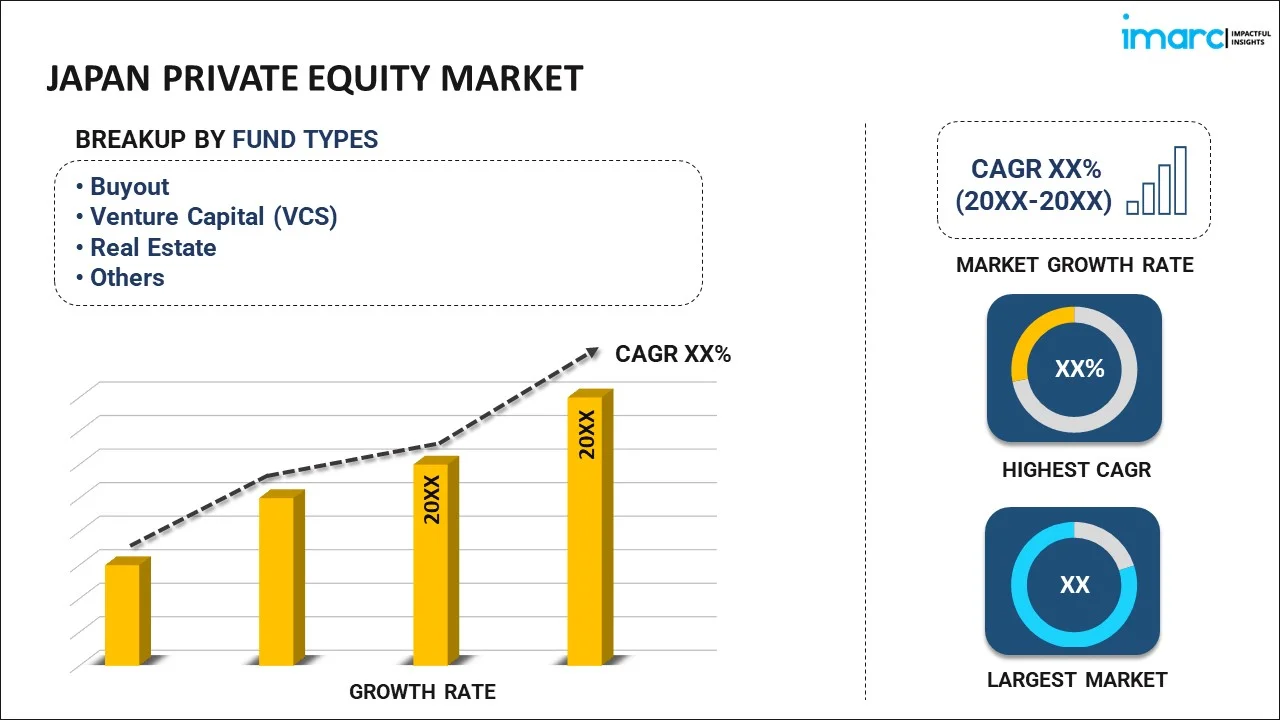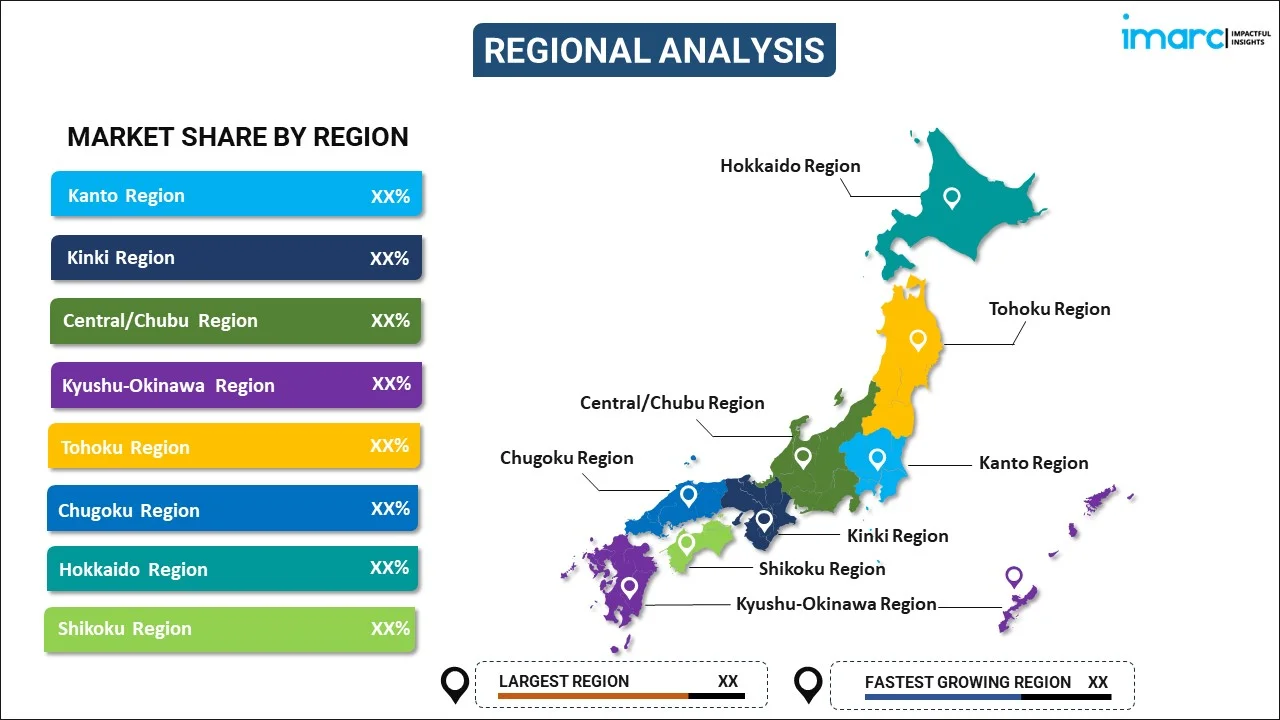
Japan Private Equity Market Report by Fund Type (Buyout, Venture Capital (VCS), Real Estate, Infrastructure, and Others), and Region 2025-2033
Market Overview:
The Japan private equity market size reached USD 40.1 Billion in 2024. Looking forward, IMARC Group expects the market to reach USD 70.1 Billion by 2033, exhibiting a growth rate (CAGR) of 5.6% during 2025-2033. The increasing interest from domestic and international investors seeking attractive investment opportunities, continual advancements in technologies and rising initiatives for sustainability, environmental stewardship, and social responsibility represent some of the key factors driving the market.
|
Report Attribute
|
Key Statistics
|
|---|---|
|
Base Year
|
2024 |
|
Forecast Years
|
2025-2033
|
|
Historical Years
|
2019-2024
|
| Market Size in 2024 | USD 40.1 Billion |
| Market Forecast in 2033 | USD 70.1 Billion |
| Market Growth Rate (2025-2033) | 5.6% |
Private equity is a financial investment strategy wherein funds are raised from institutional investors, high-net-worth individuals, and corporations to acquire ownership stakes in privately held companies. Unlike publicly traded companies, private equity firms purchase non-publicly listed companies or take substantial ownership positions in them. The primary objective of private equity is to generate substantial returns on investments by actively managing and improving the acquired companies' performance. This involvement often includes implementing strategic changes, operational improvements, and optimizing financial structures to drive growth and enhance profitability. Private equity investments typically involve a longer investment horizon compared to traditional publicly traded stocks, with a focus on medium to long-term value creation. The investments are done during various stages of a company's lifecycle, such as startup, growth, or mature phases. These funds are essential drivers of growth and innovation, particularly for companies that may not have access to traditional public financing options or are seeking operational expertise and strategic guidance. The Japan private equity market holds immense potential for investors and businesses alike, offering a wide array of investment options and value-creation opportunities. As the landscape continues to evolve, private equity firms are expected to play a vital role in driving economic growth, facilitating business transformations, and fostering innovation in the Japanese business ecosystem.
Japan Private Equity Market Trends:
The Japan private equity market is experiencing robust growth, driven by the increasing interest from domestic and international investors seeking attractive investment opportunities in the Japanese business landscape. The country's diverse industries, advanced technology sector, and robust infrastructure have garnered attention from private equity firms looking to capitalize on potential growth prospects. Furthermore, Japan's corporate landscape has undergone a transformation, with an increasing number of family-owned businesses and aging business owners seeking succession solutions. Private equity firms have stepped in to provide an avenue for liquidity events and management succession, thus creating a favorable environment for deal-making and consolidation within the market. Moreover, Japan has witnessed a growing interest in impact investing, with private equity players actively seeking opportunities in companies that prioritize sustainability, environmental stewardship, and social responsibility. This shift towards responsible investing reflects the evolving mindset of investors, who increasingly view the integration of essential business factors as an important aspect of long-term value creation and risk mitigation. In addition to traditional private equity investments, there has been a rise in the emergence of venture capital funds focused on nurturing startups and innovative enterprises. This trend aligns with the Japanese government's efforts to foster entrepreneurship and technology-driven businesses, providing further impetus to the country's vibrant startup ecosystem.
Japan Private Equity Market Segmentation:
IMARC Group provides an analysis of the key trends in each segment of the Japan private equity market report, along with forecasts at the country-level for 2025-2033. Our report has categorized the market based on fund type.
Fund Type Insights:

- Buyout
- Venture Capital (VCs)
- Real Estate
- Infrastructure
- Others
The report has provided a detailed breakup and analysis of the market based on the fund type. This includes buyout, venture capital (VCs), real estate, infrastructure, and others.
Regional Insights:

- Kanto Region
- Kinki Region
- Central/ Chubu Region
- Kyushu-Okinawa Region
- Tohoku Region
- Chugoku Region
- Hokkaido Region
- Shikoku Region
The report has also provided a comprehensive analysis of all the major regional markets, which include Kanto Region, Kinki Region, Central/ Chubu Region, Kyushu-Okinawa Region, Tohoku Region, Chugoku Region, Hokkaido Region, and Shikoku Region.
Competitive Landscape:
The report has also provided a comprehensive analysis of the competitive landscape in the market. Competitive analysis such as market structure, key player positioning, top winning strategies, competitive dashboard, and company evaluation quadrant has been covered in the report. Also, detailed profiles of all major companies have been provided.
Japan Private Equity Market Report Coverage:
| Report Features | Details |
|---|---|
| Base Year of the Analysis | 2024 |
| Historical Period | 2019-2024 |
| Forecast Period | 2025-2033 |
| Units | Billion USD |
| Scope of the Report | Exploration of Historical and Forecast Trends, Industry Catalysts and Challenges, Segment-Wise Historical and Predictive Market Assessment:
|
| Fund Types Covered | Buyout, Venture Capital (VCS), Real Estate, Infrastructure, Others |
| Regions Covered | Kanto Region, Kinki Region, Central/ Chubu Region, Kyushu-Okinawa Region, Tohoku Region, Chugoku Region, Hokkaido Region, Shikoku Region |
| Customization Scope | 10% Free Customization |
| Post-Sale Analyst Support | 10-12 Weeks |
| Delivery Format | PDF and Excel through Email (We can also provide the editable version of the report in PPT/Word format on special request) |
Key Questions Answered in This Report:
- How has the Japan private equity market performed so far and how will it perform in the coming years?
- What has been the impact of COVID-19 on the Japan private equity market?
- What is the breakup of the Japan private equity market on the basis of fund type?
- What are the various stages in the value chain of the Japan private equity market?
- What are the key driving factors and challenges in the Japan private equity market?
- What is the structure of the Japan private equity market and who are the key players?
- What is the degree of competition in the Japan private equity market?
Key Benefits for Stakeholders:
- IMARC’s report offers a comprehensive quantitative analysis of various market segments, historical and current market trends, market forecasts, and dynamics of the Japan private equity market from 2019-2033.
- The research study provides the latest information on the market drivers, challenges, and opportunities in the Japan private equity market.
- Porter's five forces analysis assist stakeholders in assessing the impact of new entrants, competitive rivalry, supplier power, buyer power, and the threat of substitution. It helps stakeholders to analyze the level of competition within the Japan private equity industry and its attractiveness.
- Competitive landscape allows stakeholders to understand their competitive environment and provides an insight into the current positions of key players in the market.
Need more help?
- Speak to our experienced analysts for insights on the current market scenarios.
- Include additional segments and countries to customize the report as per your requirement.
- Gain an unparalleled competitive advantage in your domain by understanding how to utilize the report and positively impacting your operations and revenue.
- For further assistance, please connect with our analysts.
 Request Customization
Request Customization
 Speak to an Analyst
Speak to an Analyst
 Request Brochure
Request Brochure
 Inquire Before Buying
Inquire Before Buying




.webp)




.webp)












